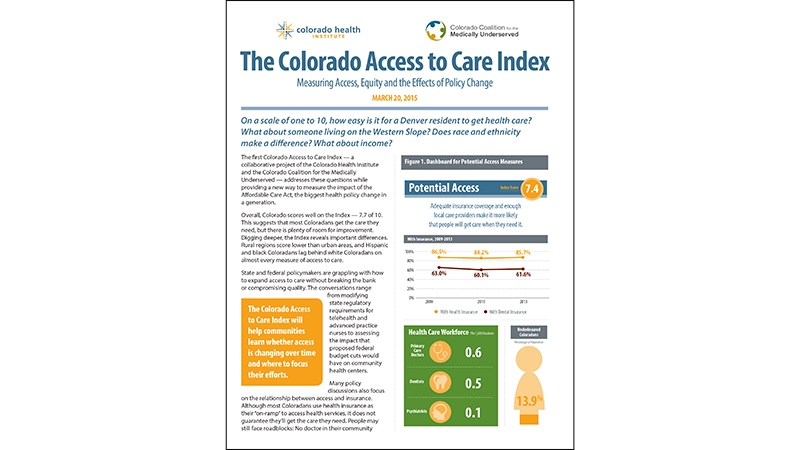Next Step: Improve Access to Care

By Sarah McAfee
Health insurance was a hot topic in 2014. With the launch of Connect for Health Colorado and the expansion of Medicaid, we have made exciting strides in increasing coverage around the state. However, coverage is just the first step toward ensuring all Coloradans can get care when they need it. Now it’s time to turn our attention to how well people can access care.
The health care community has not had the same comprehensive vision for access in Colorado that we have had for coverage. To begin addressing this, Colorado Coalition for the Medically Underserved partnered with the Colorado Health Institute to release the first-ever Access to Care Index, a set of metrics that illustrate the state of health care access in communities across Colorado.
 The Index will serve as a tool for informing our conversations and strategies for improving access to care. It not only provides access data for geographically defined regions around the state, but also for other types of communities, such as communities of color and income groups.
The Index will serve as a tool for informing our conversations and strategies for improving access to care. It not only provides access data for geographically defined regions around the state, but also for other types of communities, such as communities of color and income groups.
We also plan to release data that shows how well different age groups are able to access health care, starting with children. This affords us the opportunity to systematically tackle disparities in access among different population groups.
Data within the Index are organized into three main categories:
- Potential access, or metrics that demonstrate the system’s capacity;
- Realized access, or data that show how the system is used; and
- Barriers to care, or measures that help us understand the gap between potential and realized access.
That’s not to say that this Index comprehensively captures all of the data needed to understand access to care. Rather, it is a collection of existing data, narrowed down to be easy to gather and easy to understand, but still show progress over time.
Access to care is complex; it is best tackled at a local level, and calls for a collective effort. We hope the Access Index can provide critical data to the community conversations that are already taking place, guiding decision-making and spurring action.
Colorado’s overall score of 7.7 out of 10 is made up many different factors, and each community must decide for itself where to focus its attention and what interventions will create the biggest impact. The success of Colorado’s efforts to improve access to care is tied to the individual successes of each community’s efforts, as well as our collective efforts to address statewide inequities.
The Index can guide us in this new work, as we determine the best way to transform our health care delivery systems, test innovative approaches at the local level, and scale up what works. Health reform has really only just begun.

